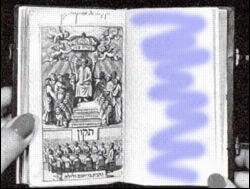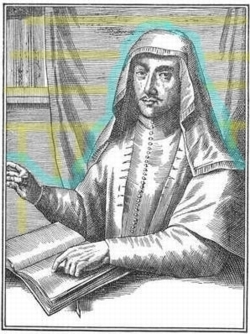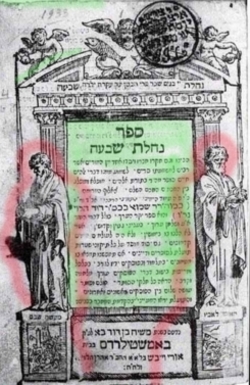 The story I tell people is this: I went to Israel in 2005 to become a rabbi and study Hasidism. I left in 2006, a rabbinical dropout studying Jacob Frank, the greatest heretic who ever lived. The implied joke is that living in Israel – Jerusalem, at least – can wash the love of Judaism right out of a person, just as it can dye it in.
The story I tell people is this: I went to Israel in 2005 to become a rabbi and study Hasidism. I left in 2006, a rabbinical dropout studying Jacob Frank, the greatest heretic who ever lived. The implied joke is that living in Israel – Jerusalem, at least – can wash the love of Judaism right out of a person, just as it can dye it in.
And, to some extent, the joke is true. Every American who spends a year or more in Israel can date their time according to which historical convulsions the country was undergoing – in 1993, I was there for Oslo; in 1998, it was the calm before the Camp David storm; and in 2005 the hitnatkut, the Israeli "Disengagement" from Gaza. The last year was the most powerful for me personally. I saw that Jewish religion and Jewish nationalism aligned almost perfectly; that for me to have any pretensions to an Orthodox, or even Ortho-practic, lifestyle was increasingly absurd on a sociological but also intellectual level; and that the Jewishness I wanted to create for myself – and I did still want to create that – would have to be a Jewishness outside the conventional boundaries of Jewish religious belief and community.
While all of this quite-typical, American-in-Jerusalem soul searching was going on, I was trying to pin down my doctoral dissertation topic at the Hebrew University of Jerusalem. I did, indeed, go to Jerusalem to study Hasidism – in particular, the remarkable and little-known writings of R. Aaron of Staroselse, the leading disciple of R. Schneur Zalman of Liady, the first rebbe of Chabad and author of that sect’s masterpiece, the Tanya. R. Aaron, who lost a succession battle to R. Schneur Zalman’s son, R. Dov Ber of Lubavitch, took his master’s ideas to their logical conclusion, which was a nondual, Vedanta-like theology in which the world we experience through our sense-perceptions has only relative reality; actually, R. Aaron taught, it’s all a dream in the mind of God – the same mind processing these words right now. It’s brilliant stuff, and I was fascinated by it.
 But while R. Aaron’s questions were just what I was most interested in at the time (and my own book on "Nondual Judaism" is well underway), his answers felt predetermined. I knew that somehow, some way, this hasidic rabbi would end up justifying the Torah-and-mitzvot lifestyle to which he was committed, as, of course, he did. The same was true of the wrestling-with-texts crowd at the American yeshivas in Jerusalem, my this-is-just-my-lifestyle dati leumi non-Anglo friends, and the rest of the observant community. Of course, there are countless sincere seekers within and beyond traditional Judaism. But in my work, as in my life, I kept being drawn to the religious margins, to the people for whom the answers are not set in advance.
But while R. Aaron’s questions were just what I was most interested in at the time (and my own book on "Nondual Judaism" is well underway), his answers felt predetermined. I knew that somehow, some way, this hasidic rabbi would end up justifying the Torah-and-mitzvot lifestyle to which he was committed, as, of course, he did. The same was true of the wrestling-with-texts crowd at the American yeshivas in Jerusalem, my this-is-just-my-lifestyle dati leumi non-Anglo friends, and the rest of the observant community. Of course, there are countless sincere seekers within and beyond traditional Judaism. But in my work, as in my life, I kept being drawn to the religious margins, to the people for whom the answers are not set in advance.
If R. Aaron was a saintly, brilliant theologian, then Jacob Frank, who lived from 1726-1790, was the polar opposite: a manipulative, vulgar cult leader who converted both to Islam and Catholicism, may have had a long-term incestuous relationship with his daughter, and was regarded by thousands of 18th-century Jews as a messianic figure. Not a nice guy – but, to me, a fascinating one, precisely because his was a theology of transgression in which no answers were assured. Indeed, in which answers were the enemy. If you see a boundary, cross it – that’s the view, because it’s what God did, mixing Godself with the impurity of the material world. Where does that end up? Some scholars call it nihilism – but it’s a nihilism that greatly influenced Frank’s contemporary, R. Israel Baal Shem Tov, and which, astonishingly, paved the way for the Haskalah in some communities, assimilation in others.
Frank was part of a Sabbatean family, and received his education in present-day Turkey. (he was born in Podolia, the same region where the Baal Shem Tov was active). Turkey was a hotbed of secret (and not-so-secret) sects of Jews who maintained that Sabbatai Zevi, who in 1666 had convinced almost one third of European Jews to be his followers until he converted to Islam under the threat of death, was the messiah. Frank was not, strictly speaking, a Sabbatean; he had his own ideas, and saw himself, not Sabbetai, as the central heroic figure. But he and his followers were called Sabbateans (the fine points being a bit too-fine to the rabbis trying to stamp out heresy), and his ideas are close enough that Frankism, as it came to be called, is generally called an "outgrowth" of Sabbateanism.
Of course, to believe that a dead man who didn’t accomplish his mission is actually the messiah requires a fair amount of cognitive dissonance – but, well, let’s just say the idea isn’t without precedent. In the Sabbateans’ case, the belief system that emerged was that the redemption is already  here, but not on the gross, material plane. (Students of Hasidism can see the parallels to the Baal Shem Tov’s identical teaching.) The purpose of religious ritual – normative and new – was to break through the walls of illusion, maintain faith in the redeemer, and find a way to live in the material world.
here, but not on the gross, material plane. (Students of Hasidism can see the parallels to the Baal Shem Tov’s identical teaching.) The purpose of religious ritual – normative and new – was to break through the walls of illusion, maintain faith in the redeemer, and find a way to live in the material world.
In the 18th century, some Sabbateans were Jews, including some well-known rabbis like (probably) R. Jonathan Eybeschutz, who kept their heretical faith hidden but maintained secret circles of believers (ma’aminim is what they called themselves). Others were Dönmeh, crypto-Jews who were outwardly Muslim but who maintained their faith in secret. Astonishingly, there are still Dönmeh in Turkey today, some of whom are now struggling to save Sabbatai Zevi’s childhood home from demolition.
This is why I study Sabbateanism: not because of the specific doctrines of the movement, or because of the personality of Sabbatai Zevi, but because these were sects of Jews who remained attached to some kind of Judaism, but who created a form of Judaism well beyond the pale of normative religious figures. Yes, there are some aspects of Sabbatean ideology that are fascinating, even titillating. The Dönmeh and the Frankists each had sexual-religious rituals, ranging from wife-swapping to kissing the naked breasts of a girl as the embodiment of the Torah/Shechinah. I’m intrigued by Frank’s innovation, in exact parallel to the Baal Shem Tov’s, that the miracle of pantheism is precisely that God is present in the illusory, material world. But above all, I’m captivated by that vertiginous moment in which there are suddenly no rules, no guides – and yet there is also a pull to faith. True nihilism bores me; I can’t think of anything less interesting than the same hipster angst that has caused people to be cool, ironic and unhappy for two hundred years. But religious anarchy – where things matter, but they’re not how the authorities say – that is the world which I actually inhabit.
Earlier scholars of Sabbateanism were attracted for similar reasons. Gershom Scholem, who invented the modern study of Jewish mysticism, wrote his longest single work on Sabbatai Zevi, and regarded him both as a religious revolutionary and a precursor to Zionism. Scholem was not alone in this characterization; when Herzl published The Jewish State, he was accused of being a new Sabbatai Zevi, because like Sabbatai, he was trying to take history into his own hands, to hasten the redemption, to act in a way that the pious reserved for God. Many of Israel’s founding generation, such as President Yitzhak Ben-Zvi (a name he chose), were likewise fascinated by Sabbateanism, and devoted considerable resources to researching and preserving its legacy. Some of the fruits of that research are reprinted in this issue of Zeek.
Other scholars see in Sabbateanism the first stirrings of reform. Few still subscribe to Scholem’s claim that the movement basically enabled the Jewish Enlightenment to happen by weakening rabbinic power structures and, for the first time, suggesting that there were serious alternatives to mainstream Jewish authority and belief. But it did play some role. And Sabbatai was the first Jewish leader to – in the 17th century – openly decry the oppression of women in Judaism, and place women in positions of power (notwithstanding his own tortured relationship with his wife, whom he essentially abandoned). This may have been a charismatically-driven mystical movement, but it did get some things right.
And then there is the mystical charge. It’s clear, from reading the documents, that Sabbateanism was the mystical movement of the day. These were the Jews who preferred the Zohar to the Talmud, who loved ecstatic prayer and dance, and who believed the world to be charged with magic. Sound familiar? Some of it was just superstition, of course, and a lot of it was providing some sense of meaning to a people persecuted and oppressed. But just imagine what it must have been like, to be part of a secret society of ecstatic Jews, convening in hidden locations to engage in ecstatic rites. I know which party I’d like to crash. Not to mention the sexual antinomianism, and the overt homoeroticism surrounding Sabbatai and one of his successors, Beruchiah Russo – a subject upon which, if I live long enough, I hope to write at some length.
Of course, there is always the tendency to project onto an object of study the characteristics of the hero one wishes to invent. Sabbatai Zevi’s prophet, Nathan of Gaza, was a complex and brilliant theologian, but Sabbatai himself can hardly be called a "religious revolutionary" in his own right, any more than the many messianic pretenders one sees walking around Jerusalem at odd hours of the night. He knew his Kabbalah, and he wasn’t a fool, but he was an erratic figure who’s hard to pin down exactly. And Jacob Frank is certainly no hero, despite my own wish that he be one; reading the assemblage of his oral teachings is sometimes like poring through the ramblings of a lunatic. So I try not to let my enthusiasm blind me to the reality of these flawed human beings and the complicated religious movements they headed, and I am fortunate to be held in check by the requirements of academic discipline.
The truth is, there is much we may never know about the Sabbateans. Were they antinomians, or pietists, or both? Were Frank’s followers dupes, or mystics, or both? Who was ascetic and who hedonistic? Who revolutionary and who merely a crank? We do know, however, that they were heretics, someone who actively chooses his or her own belief system (heretic comes from the Greek aireo, to choose) without looking for guidance to authority figures. Of course, the heretic is rare today precisely because she is ubiquitous; in our day, thank God, everyone chooses to believe what they want, which makes the notion of a heretic a rather empty one. It’s a gesture, more than anything else.
But beneath that gesture is, for me at least, a kind of reassurance, and a courage as well. Yes, the heretics tell me, there are those of us in love with God, but not in love with religion. We even cherish our particular religious path, albeit not in the way our teachers tell us. It would be easier to give it up, smoke more cigarettes, and brush off the calls of the heart. But you don’t have to do that, and we didn’t. I’ve long since given up thinking that religion will save the world, and have, like many people, begun to wonder if it will destroy it. Heresy, however – freely thinking, sincerely feeling, personally embodied, and spiritually awake – may have a shot.








Great, thanks for sharing this blog post.Much thanks again. Much obliged.
Your blog rocks. Thank you for keeping it going
This will be the proper weblog for anybody who hopes to find out about this topic. You recognize a great deal its nearly challenging to argue with you (not too I just would want…HaHa). You certainly put a fresh spin using a topic thats been revealed for a long time. Wonderful stuff, just wonderful!
weight loss is sometimes difficult to attain, it all depends on your motivation and genetics,,
Replica Bags Wholesale I have found myself coming over to your blog site more often so much that my visits are just about every day now! [Reply]
After study just a few of the blog posts in your web site now, and I actually like your means of blogging. I bookmarked it to my bookmark website listing and will probably be checking again soon. Pls check out my web page as properly and let me know what you think.
Youre so cool! I dont suppose Ive read something similar to this before. So nice to get somebody by incorporating authentic applying for grants this subject. realy appreciation for starting this up. this website are some things that’s needed over the internet, somebody after a little bit originality. helpful project for bringing something new to the web!
Вчера в России приняли решение заблокировать Tor.
Почему суд Саратовской области ополчился на анонимный
браузер?
В России сайт браузера Tor заблакировали утром 8 го декабря.
Первые сообщения от российских пользователей
о проблемах с работой браузера Tor появились еще 1 декабря.
Проблема не была массовой, хотя
Россия и считается одним из лидеров по
количеству жителей, использующих
Tor. Возможное объяснение этому — относительно простой способ обхода блокировок.
Сначала в сети появились сообщения о том, что страница Torproject.org была внесена
в Единый реестр запрещенной информации.
В самом РКН сообщили «Ленте.ру»
что основанием для этого стало «размещение на портале информации, обеспечивающей работу средств, предоставляющих доступ
к противоправному контенту».
К таким как сайты Hydra и зеркал на Гидра onion.zerkalo-hydra4af.com Судя по
всему, речь идет о том, что на сайте браузера была
опубликована инструкция по его применению.
Однако проблема заключается не столько в этой инструкции,
сколько в том, что с помощью Tor можно посещать сайты, которые Роскомнадзор блокирует на протяжении многих лет.
hydraruzxpnew4af.onion
[url=https://hydraruxpnew4af.com]гидра сайт[/url]